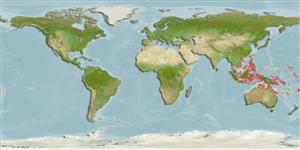>
Gobiiformes (Gobies) >
Microdesmidae (Wormfishes) > Ptereleotrinae
Etymology: Parioglossus: Greek, pareia = jaw + Greek, glossa = tongue (Ref. 45335).
More on author: Smith.
Environment: milieu / climate zone / depth range / distribution range
Ecologie
marien; brak water rifbewoner; diepte 0 - 15 m (Ref. 48444). Tropical; 25°N - 24°S
Western Pacific: Gulf of Thailand to Fiji, north to Yayaema Islands, south to northwestern Australia and the southern Great Barrier Reef.
Grootte / Gewicht / Leeftijd
Maturity: Lm ? range ? - ? cm
Max length : 4.5 cm SL mannelijk / geslacht onbekend; (Ref. 48637)
Korte beschrijving
Determinatiesleutels | Morfologie | Morfometrie
Dorsale stekels (totaal) : 6 - 7; Dorsale zachte stralen (totaal) : 13 - 15; Anale stekels: 1; Anale zachte stralen: 13 - 15.
Occurs in shallow coastal reefs and mangrove-lined inlets. Hovers in schools among branching corals or mangroves to a depth of about 4 meters.
Levenscyclus en paargedrag
Maturities | Voortplanting | Spawnings | Egg(s) | Fecundities | Larven
Myers, R.F., 1991. Micronesian reef fishes. Second Ed. Coral Graphics, Barrigada, Guam. 298 p. (Ref. 1602)
Status op de Rode Lijst van het IUCN (Ref. 130435)
Gevaar voor de mens
Harmless
Gebruik door de mens
Tools
Speciale rapporten
Download XML
Internetbronnen
Estimates based on models
Preferred temperature (Ref.
123201): 26.1 - 29.3, mean 28.7 °C (based on 1701 cells).
Fylogenetische diversiteitsindex (Ref.
82804): PD
50 = 0.5000 [Uniqueness, from 0.5 = low to 2.0 = high].
Bayesian length-weight: a=0.00389 (0.00180 - 0.00842), b=3.12 (2.94 - 3.30), in cm total length, based on all LWR estimates for this body shape (Ref.
93245).
Trofisch niveau (Ref.
69278): 3.2 ±0.4 se; based on size and trophs of closest relatives
Fishing Vulnerability (Ref.
59153): Low vulnerability (10 of 100).
